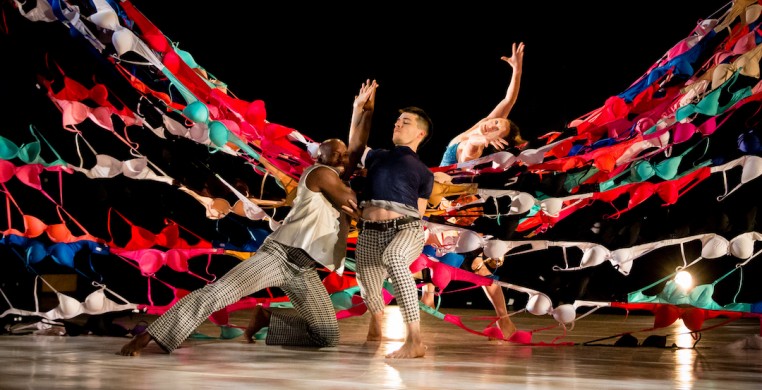Racism, sexism, homophobia, the hypocrisy of Victorian mores in post-World War II America, the military draft lottery and the Viet Nam War all fueled a stormy climate that gave rise to the 60’s protest era and the counter-culture rock music that accompanied it.
Fast-forward to 2016 where we find ourselves weathering a stormy national climate of an entirely different sort. What are the connections? This is the question “RockCitizen” seems to be asking as The Seldoms revisit the 60’s, its music, and the intersection of anger, a sense of betrayal, and the irreverence of an unprecedented number of disaffected young people that overloaded the system to the breaking point.
“RockCitizen” (Storefront Theatre, through May 15th) romps across the whole era in a one-hour distillation that touches upon a constellation of intersecting factors, embodying a complex tapestry of social and political phenomena in movement, spoken and written text, song, voice-overs, video, and recorded music, all in front of, behind, and wrapped-up in Bob Faust’s multi-functional Brascape. Consisting of 216 rainbow-colored bassieres, stitched together on ingeniously-designed moveable rigging, the Brascape delivers a terrific visual and visceral punch as metaphor, prop, backdrop, and moveable set. As such, it becomes, greater than the sum of its bras, the undisputed star of “RockCitizen.”
The Seldoms’ theatrical extrapolation of a unique and ultimately transformative time in American history and culture seeks to push its audience toward discomfort with increasingly provocative gestures, bold song and dance scenes of sexual boundary-breaking, pot-smoking, acid-dropping, playing around the edges of lewd and in-your-face confrontation, and yet it’s all kind of fun. And funny. Except when it dips, infrequently, into dead serious. Judicious self-discipline keeps the snarling dogs of political agendas at bay, opting for understated reportage, light-hearted parody, and an authentic poetry of movement, designed to coax its audience to active contemplation.
The audience Thursday night was completely on board for the ride, wherever The Seldoms wanted to take us, including no hesitation accepting Philip Elson’s invitation to join in singing “Sing if you’re glad to be gay” with them, which speaks volumes for the level of trust this ensemble inspires in its audience.
One of the Seldoms' most notable attributes, among many, is its ability to hit both satire and drama, parody and pathos, in a fluent conversation across the boundaries of its collaborative artistic disciplines, with modern dance at its core. The conversation in "RockCitizen" rings true, if somewhat disjointed.
The hippie movement, Haight-Ashbury, LSD, militant feminism, Betty Friedan, Pete Seeger, The Beatles, pot-smoking, Janis Joplin, war protest marches, Bob Dylan, the civil rights movement, James Baldwin--all figure into “RockCitizen” in discrete, always-engaging segments that bounce off each other in a fast-paced flow, but don’t seem to necessarily connect in narrative sequence or climactic build.
When the lights came up on Thursday’s opening night of “RockCitizen,” six Seldoms dancer/singer/actors assembled across the black-box stage in slightly outrageous hippie garb singing, “Freedom’s just another word for nothing left to lose.” A seventh player, sitting on the sidelines with a megaphone, coached them to “try it with a little more intensity,” and other variations.
With that, The Seldoms were off and running with a comic convention, repeated in different contexts at intervals throughout the performance, that commented on itself, taking some of the sting out of some hard-hitting material. “Talk” by James Baldwin created auditory and visual accompaniment for what was perhaps the evening’s deepest emotional moment--a dance monologue exquisitely performed by Damon Green.
Strong ensemble dancing had the cast, in combinations of five, three, or two, making themselves into a human jungle gym, pretzeling in and out of each other’s arms and legs. Fluid lifts and shifts powered ongoing spoken text, leveraging each other’s bodies on the ground and into the air in hand-over-leg elasticity that morphed shapes in kaleidoscopic transformations, interesting movement, but ultimately not furthering the movement of meaning in the whole.
It was difficult to process the spoken voice, movement, and projected written text all at the same time in a number of voice-over instances, including Pat Buchanan’s speech on child welfare and The Nixon-Elvis interview. The result was dissipated meaning. Irony, an important component of artistic director Carrie Hanson’s juxtaposition of text and movement, was lost on partially-intelligible text. It felt as if “RockCitizen” was trying to hit too many bullet points, the result being a parodic, generalized catalogue of the era rather than an in-depth investigation of its impact.
The Seldoms, who self-describe as “committed to bringing audiences an expanded experience of dance that ignites thought and understanding of real-world issues....,” tackled the personal and political life of Lyndon Johnson in last year’s “Power Goes” with astounding impact. “RockCitizen,” described as a companion piece, is much more diffuse, tackling a range of subject matter that is by nature, unlike “Power Goes,” not a linear story to tell, which may be why the sum of its parts appears greater than the whole.

